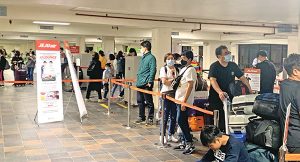CNMI in state of emergency

Tourists in face masks line up at the Francisco C. Ada/Saipan International Airport as a preventative measure against the novel coronavirus, 2019-nCoV. (KIMBERLY A. BAUTISTA)
The CNMI is now under a state of significant emergency, with a ban in place against the entry of travelers from mainland China, chiefly to prevent the entry of the novel coronavirus, 2019-nCoV, which first arose in Wuhan, China.
In an executive order yesterday, Gov. Ralph DLG Torres declared a state of significant emergency in the Commonwealth and ordered the creation of response, quarantine, and preventive containment measures in the CNMI.
He was quick to assure, though, that that the decision to issue the executive order is just a precautionary measure. “I am issuing the emergency declaration out of an abundance of caution to ensure that the CNMI stays safe and that we minimize the potential exposure of our people to this highly communicable virus,” Torres said in a press statement last night.
The state of significant emergency takes effect immediately, and shall remain in effect for 30 days, unless terminated by the governor.
Torres’ executive order directs the Commonwealth Ports Authority to “seek to suspend” both direct and “indirect” travelers from mainland China. Since the CNMI does not have the authority to stop travelers from China from flying to the CNMI without federal consent, this process will be done in collaboration with the airlines, U.S. Department of Transportation, U.S. Federal Aviation Administration, and the U.S. Department of Homeland Security.
“Indirect” travelers from China refer to travelers who transit through Incheon or elsewhere when coming to the CNMI.
Some countries in Micronesia such as Palau and the Marshall Islands have already imposed travel bans from mainland China.
According to yesterday’s emergency declaration, travelers from mainland China to United States destinations and several countries such as Hong Kong, Macau, Thailand, Australia, Malaysia, Singapore, Taiwan, South Korea “have been identified with nCoV as of Jan. 28, 2020.”
“The nCoV poses a significant and imminent threat of harm to the community, environment, and people of the CNMI and this emergency declaration issues in order to respond, quarantine and ensure the prevention of or containment of nCoV in the CNMI,” Torres stated.
Under the directive, CPA shall communicate with all airlines with travelers directly and indirectly from mainland China to suspend the arrival of travelers for the period of this emergency declaration.
The Commonwealth Health Care Corp., which runs the local hospital, the Commonwealth Health Center, is also directed to coordinate with CPA to develop protocols, quarantine measures, and other increased monitoring and control at CNMI airports and seaports as to all arriving travelers, passengers and cargo for screening for nCoV.
Due to the expected decreased tourism income, Torres directed the Finance secretary and the Office of Management and Budget to make a cost-impact analysis and make recommendations within 30 days, for adjustments to the CNMI’s fiscal year 2020 budget. The analysis shall be furnished to the Legislature.
The virus has already caused 132 deaths and there are now almost 6,000 confirmed cases in affected countries.
The Torres administration also clarified that, as of Jan. 29, 2020, there are no suspected or confirmed coronavirus cases in the CNMI.
Torres said his administration remains confident that the precautionary measures implemented by CNMI government agencies will ensure proper screening for the coronavirus.



























